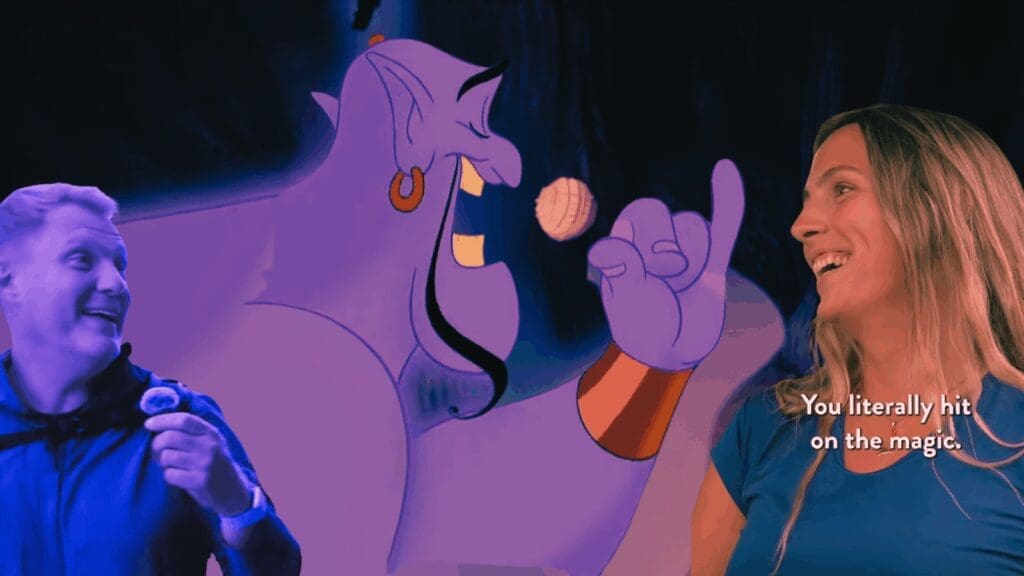This is a Self-Help Illusion, Not Responsible Coaching

Sometimes I stumble on something that captures what feels off about the way we think about progress, purpose, and success. It happened earlier this week…
The algorithm showed me a video that caught my attention. Initially, I wondered whether it was performance art, a comment on the power of suggestion and how easily we’re swayed by confidence. But no, it was an on-street “coaching” encounter from a self-help illusionist with a passing member of the public. And I believe it serves as a clear example of a performative magic trick, dressed in the clothing of coaching.
The Illusion of Help
The man in the video approaches someone and asks, “What’s your dream?” When she replies, “To be rich,” he smiles knowingly. “Do you know how to get rich? I’m rich, so I know.” He introduces a challenge, saying he’ll give her £100 if he can’t help her find her dream in two minutes.
The video is designed to appear altruistic and inspiring, which is why it appeals to so many people. But there’s another factor at play. It’s a competitive conversation. As strange as that sounds, the goal is not to help, but to give the illusion of help so that by the end, she believes he has done what he said he would do.
What follows is a rapid-fire series of assumptions, projections, and emotional hooks. She says she loves running when he asks what she does despite not being paid. He then latches onto this as her dream, which he rapidly transforms into a moral quest, putting words in her mouth about how she must want others to feel the same energy, freedom, and health that she does.
The Burden of Other People’s Assumptions
And pow! He says: “Maybe you’re meant to help people get that feeling” .
These words carry a lot of weight as he positions himself as the medium between her and the divine purpose for which she is on earth. He is a prophet, speaking on behalf of this sacred duty that she must dedicate her life to.
This moment captures something that happens all the time in our culture of relentless improvement: we’re told that what we love must be useful, monetised, or shared. It’s not enough to run for the joy of running. You must start a brand. Build a movement. And then the true missional sucker punch…save the children!
Within a minute, she has been told she is responsible for saving the world from obesity. And we’ve heard her say very little to indicate this dream belongs to her.
When someone else defines your dream, they also define your duty. They turn curiosity into responsibility, and joy into work. The burden isn’t apparent in the moment, especially when it’s wrapped in flattery, but it can linger long after.
That little phrase, maybe you’re meant to… , can carry a lot of weight. Because if you later decide not to pursue that “purpose,” it can feel like a betrayal; of yourself, of others, of some imagined higher calling.
The man in the video uses spiritualised language that sounds empowering but functions as a form of control. He presents himself as a medium between her and her destiny. This advising, projecting, and colonising of her story is the opposite of a healthy coaching conversation. He dictates meaning instead of helping her find it.
The Pace of an Illusion
There’s also something important to say about speed. The pace of his delivery is relentless. There’s no pause, no reflection, no space for her to connect with her own thoughts. The relentless rhythm becomes part of the persuasion, sweeping her along in a wave of nods and agreement. There’s no time for her to pause, think, and push back.
Coaching, when it’s done well, works at the pace of reflection. It leaves space for deeper questioning around any reaction. It’s certainly not about giving people the answers or rushing to conclusions. Pace is not a sign of impactful coaching, yet in this case, it is used as part of the illusion to trick Natalie and those watching the video into believing that something impactful has occurred. It hasn’t. At least, not in a positive way.
True impact comes when we have space to hear ourselves think, and to observe metacognition as we explore the thoughts and feelings we have in response to those responses.
The illusion expands from the confidence in his performance. He says what she needs to hear to feel moved (like her life could matter more than it does, and that there’s a divine plan for it if she’s open to it). But this story is shaped by his agenda and infused with his assumptions, beliefs, and values. We know nothing about hers. But when he moves on to the next person for his show reel, she will be left to carry the emotional debris. She carries this expectation of becoming someone she never asked to be and of doing something she didn’t express interest in. But to decide not to would be to go against the authority figure’s injunction. He waggles his finger and declares, “I’m not joking” as he enforces this serious divine proclamation.
How Can I Keep Doing This?
This kind of encounter reinforces a damaging narrative of modern life: that everything we enjoy must become a side hustle and be done for a productive outcome. Equating a dream or purpose with making a living is a subtly insidious notion.
If you love running, think very carefully before you try to turn it into a business. What if the goal is to sustain the source of joy in your life? For example, if you love making greeting cards for people, writing songs, or baking cakes, rather than asking, “How can I turn this into a business?” ask yourself, “How can I keep doing this?” Consider what “this” is. And notice whether your “this” would be extinguished if you went down the road depicted in this video.
Returning to Natalie, when she says she loves running, the next question might be, what is it you love about it? How can you keep doing it? How might you bring what you love about running into other areas of your life as well?
Rather than focusing on the surface, as he does in this video, notice the pulls and pushes beneath it. These are often small, quiet, and slow. They require time to observe. While they can have momentary aha insights, the grand epiphany is usually found in the iterative movement toward what feels present and meaningful to you personally.
Authentic coaching is collaborative, consensual, and moves at the individual’s pace. And in case you’re wondering, an ethically trained coach would never coerce a coaching conversation in the way we see in this video, without permission. You certainly wouldn’t pounce on someone with the camera rolling or lay down a challenge like a magic trick.



